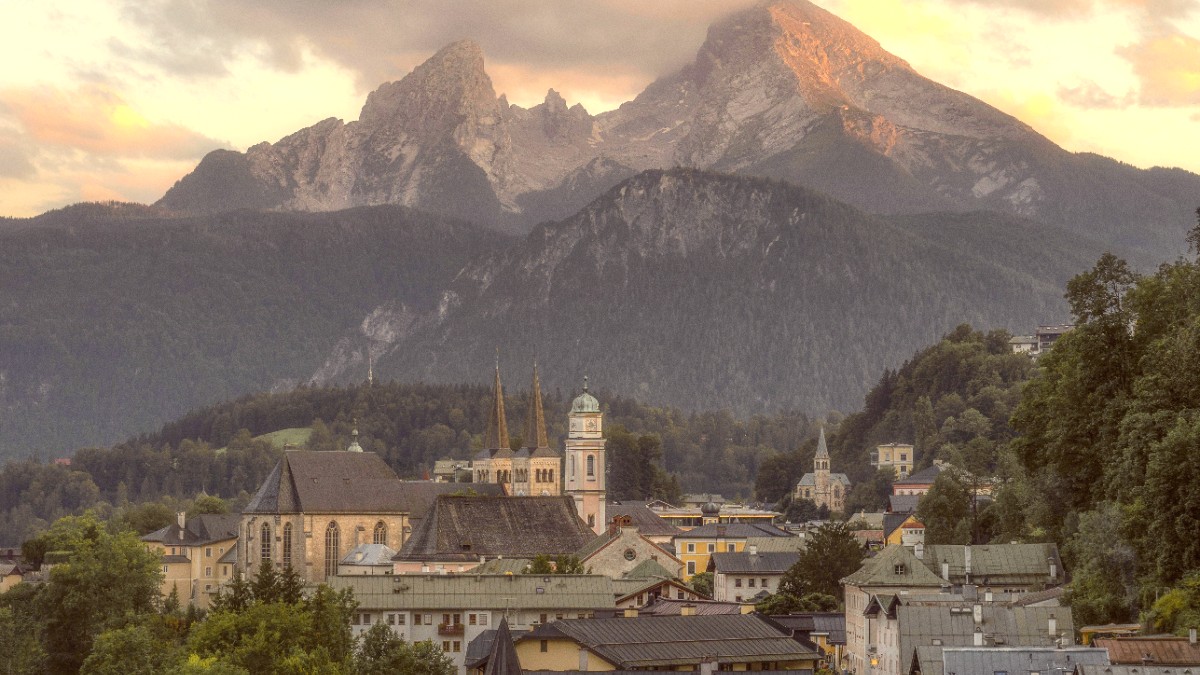
Bavarian Alps, Germany
Spring (April-May): Temperatures typically range from 5°C to 15°C (41-59°F). Weather varies during this period. Snow might still be present at higher elevations, while valleys begin to show green growth. Expect moderate rainfall.
Summer (June-August): This is the warmest period, with temperatures between 15°C and 25°C (59-77°F). Temperatures occasionally rise higher. The landscape is lush and green. Thunderstorms occur, especially in the afternoons. Humidity levels are generally lower.
Ideal timing for specific activities or experiences:
Hiking & Mountain Activities: Mid-June to early October provides the best weather and access to all trails. Königssee Boat Trips: From May to mid-October, the full route to St. Bartholomä and Salet operates. Winter provides limited service to St. Bartholomä only. Eagle's Nest (Kehlsteinhaus): Operates only from mid-May to mid-October, weather permitting.
July-August & December-March
All attractions operate, weather supports hiking, skiing conditions are optimal, atmosphere feels lively.
Expect crowds, higher prices for accommodation and some activities, queues at popular sites.
May-June & September-October
Fewer crowds, pleasant temperatures for outdoor activities, lower prices, beautiful spring blooms or autumn foliage.
Some mountain facilities may still close in early spring or late autumn. Weather varies.
November & April
Experience the fewest crowds and lowest prices. The serene atmosphere provides an unique experience.
Many attractions and hotels may close or operate with limited hours. Weather may bring rain or early snow. Some hiking trails may become inaccessible.
Germany is part of the Schengen Area. Citizens of many countries, including the United States, Canada, Australia, New Zealand, Japan, South Korea, and most South American countries, enter Germany for tourism or business for up to 90 days within any 180-day period without a visa.
Your passport must be valid for at least three months beyond your intended departure date from the Schengen Area. It must also be issued within the last 10 years.
Show you have enough money to cover your stay and return journey.
Have proof of your plan to leave the Schengen Area.
Required for Schengen visa applicants. Recommended for all travelers.
You will need passport-sized photos, a completed application form, proof of accommodation, and a flight itinerary.
Costs vary based on your travel style.
The official currency is the Euro (€). ATMs (Geldautomat) are widely available in Berchtesgaden and surrounding towns. Most hotels, larger restaurants, and shops accept major credit cards (Visa, Mastercard). Smaller establishments, guesthouses, or some street food vendors may prefer cash.
Price ranges for accommodations, meals, transportation, and attractions:
Berchtesgaden Guest Card provides free RVO bus transport in the region.
| Item | Description | Price |
|---|---|---|
| Local Bus Single | Ticket | €2.50-€4.00 |
| Königssee Boat Trip | Full Round Trip | €25-€30 |
| Jennerbahn Cable Car | Return | €35-€40 |
| Eagle's Nest Bus | Return, including memorial entry | €30-€35 |
| Salt Mine (Salzbergwerk) | Entry | €23 |
| Dokumentation Obersalzberg | Entry | €5 |
| Berchtesgaden Royal Palace | Entry | €15 |
Awareness of local conditions and preparation are .
Routine vaccinations are up-to-date. Consider Hepatitis A and B. For extensive outdoor activities, TBE (FSME) vaccination is a consideration. Consult a healthcare provider before travel.
Tap water in Berchtesgaden and throughout Germany is safe to drink unless explicitly stated otherwise.
Standards are high. Restaurants and food stalls generally adhere to strict regulations.
Crime Statistics & Safety Concerns:
Berchtesgaden is a safe destination with low crime rates. Violent crime is rare. Petty crime, like pickpocketing, occurs in crowded tourist areas, but it is not a significant concern here. Exercise standard precautions: keep valuables secure and be aware of your surroundings.
No specific neighborhoods are known for higher crime rates.
Natural Disaster Risks: Avalanches during heavy snowfall, rockfalls/landslides after heavy rain, and severe thunderstorms in summer afternoons are possibilities. Heed official warnings.
Dial 112 for ambulance and fire brigade. Dial 110 for police.
Pharmacies are widely available. Look for the green "A" sign. Most close on Sundays and public holidays, but emergency pharmacies (Notdienstapotheke) are available. Schedules for these emergency services are posted outside pharmacies.
Krankenhaus Berchtesgaden (Vinzentinum Berchtesgaden) serves as the local hospital. For non-emergencies, visit a general practitioner (Allgemeinarzt).
Keep these contacts readily available for unforeseen circumstances.
Be aware of conditions to ensure a smooth journey.
Common in wooded and grassy areas, especially during warmer months. Use insect repellent and check thoroughly for ticks after outdoor activities.
Berchtesgaden itself is not at very high altitude, but some mountain hikes can go above 2,000 meters. Stay hydrated and avoid overexertion.
Even at higher altitudes, sun exposure is intense. Use high-SPF sunscreen, wear hats, and stay hydrated.